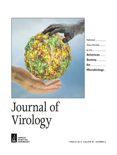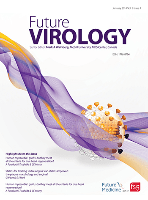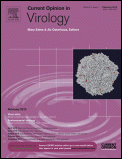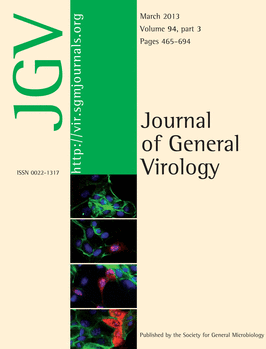
VIROLOGICA SINICA
metrics 2024
Showcasing Cutting-Edge Discoveries in Virology
Introduction
VIROLOGICA SINICA, published by KEAI PUBLISHING LTD, is a leading international journal dedicated to the field of virology. With an ISSN of 1674-0769 and E-ISSN of 1995-820X, this esteemed journal showcases cutting-edge research from 2006 to 2024, focusing on critical developments in Immunology, Infectious Diseases, Molecular Medicine, and Virology. As evidenced by its respectable positioning in the Q2 quartile of relevant categories and impressive Scopus rankings—such as Rank #20/80 in Virology—VIROLOGICA SINICA serves as an essential resource for researchers, professionals, and students aiming to deepen their understanding of viral pathogens and their impact on human health. While the journal does not currently offer open access, it remains an invaluable publication for those seeking to stay at the forefront of virology research. Its address is located at 16 Donghuangchenggen North St, Beijing, China, where it continues to foster academic excellence in the rapidly evolving landscape of virology.
Metrics 2024
 0.93
0.93 4.30
4.30 4.30
4.30 47
47Metrics History
Rank 2024
Scopus
IF (Web Of Science)
JCI (Web Of Science)
Quartile History
Similar Journals

ARCHIVES OF VIROLOGY
Championing rigorous research in viral science.Archives of Virology is a prestigious academic journal dedicated to the field of virology, published by Springer Wien. Established in 1975, this journal has been a crucial platform for disseminating innovative research findings and advancements in the understanding of viral diseases and their impact on human health. It holds a notable position in the academic landscape, with a 2023 impact factor placing it in Q2 within the field of Medicine (miscellaneous) and Q3 in Virology. Its Scopus ranking within the Virology category further underscores its relevance, with a notable percentile of 45th. Although it does not provide Open Access options, the journal's rigorous peer-review process ensures the highest quality of published work, making it an essential resource for researchers, professionals, and students aiming to stay updated in the rapidly evolving field of virology. For those committed to advancing their understanding of viruses and viral diseases, Archives of Virology is a vital scholarly resource.

Journal of Virology
Leading the Charge in Virology ResearchJournal of Virology is a premier scholarly journal dedicated to advancing the field of virology, focusing on the molecular mechanisms of virus-host interactions, viral pathogenesis, and the latest therapeutic and vaccine developments. Published by the American Society for Microbiology, this esteemed journal has been a cornerstone for researchers since its inception in 1967, providing a platform for high-quality, peer-reviewed research. With a commendable impact factor indicative of its relevance and influence, the journal is categorized in the top quartile (Q1) for Virology, Microbiology, and Insect Science, reflecting its significance in these fields. Researchers can access a wealth of studies and findings that shape our understanding of viruses and their interactions with hosts, highlighting its role in both basic and applied sciences. Positioned in the United States, the Journal of Virology serves a global audience, ensuring that cutting-edge discoveries reach professionals, students, and academics alike. Join the conversation as we explore the complexities of virology and its implications for human health and disease.

Future Virology
Innovating Solutions for Global Health ChallengesFuture Virology, published by Future Medicine Ltd, is an essential journal dedicated to advancing the understanding of virology in the contemporary scientific landscape. With an ISSN of 1746-0794 and an E-ISSN of 1746-0808, this journal serves as a platform for researchers and practitioners in the field to publish high-quality, peer-reviewed articles that explore novel discoveries, innovative therapeutic strategies, and the implications of viral research on global health. Operating from the United Kingdom and maintaining a commitment to rigorous scientific inquiry, Future Virology is categorized in the Q4 Quartile for Virology according to the latest Scopus rankings, with a position of Rank #48/80 and a percentile of 40th in the Virology category. Although it currently does not offer open access, the journal strives to disseminate critical insights that benefit a wide range of professionals, researchers, and students engaged in virology and related fields. By bridging the gap between basic research and practical applications, Future Virology plays a crucial role in fostering innovation and collaboration in the ever-evolving virology landscape.

Current Opinion in Virology
Advancing Virology: Insights for Tomorrow's ChallengesCurrent Opinion in Virology, published by Elsevier Science Ltd, is a premier journal dedicated to advancing knowledge in the dynamic field of virology. Established as a respected source of comprehensive reviews and critical evaluations, this journal boasts an impressive impact factor and has achieved a distinguished Q1 category ranking for virology, signifying its pivotal role in the academic community. Serving researchers, professionals, and students alike, Current Opinion in Virology presents insightful contributions that delve into the latest developments, emerging trends, and pivotal challenges facing virology today. With its Scopus ranking placing it in the top 15% of its field, the journal provides unparalleled access to cutting-edge research that informs both basic and applied aspects of virology. Although not an open-access journal, it offers options for subscriptions that ensure accessibility to critical content. As the field continuously evolves, Current Opinion in Virology remains at the forefront, bridging the gap between research and clinical application, making it an essential resource for all in the virology community.

Annual Review of Virology
Transforming complex findings into accessible knowledge.Annual Review of Virology is a premier scholarly journal published by Annual Reviews, dedicated to advancing the field of virology through comprehensive and insightful reviews. Since its inception in 2014, this journal has established itself as a leading resource for researchers, professionals, and students alike, achieving an impressive Q1 ranking in the field of Virology and a Scopus rank of #10 out of 80 in its category, placing it in the 88th percentile. The journal features in-depth analyses of the latest developments in virology, encompassing various aspects such as viral pathogenesis, host interactions, and antiviral strategies, thereby catering to a diverse audience seeking the most relevant and cutting-edge information. Although it is not Open Access, Annual Review of Virology remains an indispensable tool for those engaged in virology research, transforming complex findings into accessible knowledge that shapes future investigations and practical applications in the field.

Journal of Virus Eradication
Transforming knowledge into action against viruses.Welcome to the Journal of Virus Eradication, a premier publication dedicated to advancing the field of virology and infectious disease research. Published by MEDISCRIPT LTD, this journal provides a vital platform for sharing cutting-edge research findings in key areas including epidemiology, immunology, and public health. With an impressive classification of Q2 in Epidemiology and Infectious Diseases for 2023, this journal exemplifies a commitment to high-quality scholarship and impactful research. The Journal of Virus Eradication is instrumental in disseminating knowledge that tackles viral threats, contributing to global health initiatives aimed at virus containment and eradication. Researchers, professionals, and students alike will find this journal an invaluable resource, making significant contributions to the scientific community and society at large.

Advances in Virology
Fostering Collaboration for Viral BreakthroughsAdvances in Virology, an esteemed journal published by HINDAWI LTD, serves as a pivotal platform for cutting-edge research in the field of virology and infectious diseases. With its ISSN 1687-8639 and E-ISSN 1687-8647, the journal has been a significant contributor to the scientific community since its initiation as an Open Access resource in 2009, allowing researchers from around the globe to access groundbreaking findings without barriers. Operating out of the United States and recognized for its commitment to high-quality research, the journal's relevance is underscored by its ranking in the Q3 category for Infectious Diseases and Q4 for Virology as of 2023. The time frame of publications spans from 2009 to 2024, reflecting a continuous commitment to exploring the evolving landscape of virology. This journal not only promotes the dissemination of novel insights and methodologies but also fosters collaboration and innovation within the scientific community, making it an invaluable resource for researchers, professionals, and students alike.

Virus Evolution
Innovating our understanding of viral behavior and trends.Virus Evolution is a premier open access journal published by Oxford University Press, dedicated to advancing the understanding of viral dynamics and evolutionary trends. Established in 2015, it has quickly ascended to a leading position in the fields of Microbiology and Virology, achieving a remarkable Q1 ranking in both categories for 2023. With its impactful research output, it ranks #27 out of 182 in Microbiology and #15 out of 80 in Virology, placing it in the top percentiles of the Scopus rankings. The journal serves as a vital resource for researchers, professionals, and students, providing a platform for the dissemination of innovative research that explores the genetic and ecological aspects of viruses. By embracing an open access model, Virus Evolution ensures that its high-quality content is accessible to a global audience, fostering collaboration and enhancing the impact of virology research worldwide.

Frontiers in Virology
Unlocking the Secrets of Virus BiologyFrontiers in Virology, published by FRONTIERS MEDIA SA, is an innovative open-access journal dedicated to advancing the understanding of viral biology, pathogenesis, surveillance, and control strategies. With the rapid evolution of viral threats, this journal serves as a critical platform for researchers, professionals, and students to disseminate and access high-quality research, reviews, and perspectives in virology. The journal places a strong emphasis on interdisciplinary approaches, promoting collaborative efforts that drive breakthroughs in the field. While the specific impact factor and H-index details are currently unavailable, Frontiers in Virology is committed to rigorous peer review and integrity in scientific publishing. Authors and readers will benefit from the extensive reach provided by open access, making groundbreaking insights available to a global audience, thus contributing significantly to the ongoing dialogue in virology and public health.

JOURNAL OF GENERAL VIROLOGY
Unveiling viral mysteries, one study at a time.The JOURNAL OF GENERAL VIROLOGY, published by the Microbiology Society, is a premier academic journal dedicated to advancing the field of virology. Established in 1967, this influential journal covers a wide spectrum of research from basic virology to applied studies, serving as a vital resource for researchers, professionals, and students alike. With its ISSN 0022-1317 and E-ISSN 1465-2099, the journal is recognized for its rigorous peer-review process and high-quality publications, attaining a commendable Q2 ranking in the Virology category for 2023. The journal's focus on disseminating innovative findings and fostering critical discussions contributes significantly to the understanding of viral mechanisms, disease processes, and potential therapeutic strategies. Although it does not currently offer Open Access options, the journal remains accessible to the academic community, with a strong commitment to supporting virology research globally. As part of Scopus' top-tier rankings, illustrating its impact within the category of Immunology and Microbiology, the JOURNAL OF GENERAL VIROLOGY continues to play a pivotal role in shaping the future of virological science.